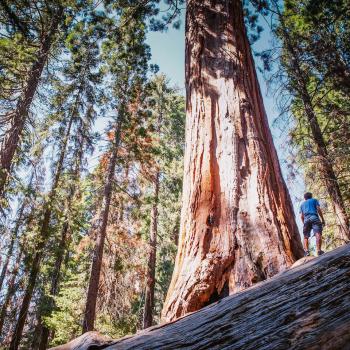
Who is the greatest figure in the history of American spirituality? If you ask me this highly subjective question, I’d argue it’s the philosopher Ralph Waldo Emerson. Here’s his story.
A graduate of the Harvard Divinity School in 1821, Emerson serves for three-plus years as a minister at a Unitarian church. But at the age of 29 he decides to call it quits, not because of a crisis of faith, but due to a loss of confidence in the church. Emerson has issues with the acts of public prayer and communion, as well as the unchanging nature of the church itself. In his words:
In order to be a good minister, it was necessary to leave the ministry. The profession is antiquated. In an altered age, we worship in the dead forms of our forefathers…this mode of commemorating Christ is not suitable to me. That is reason enough why I should abandon it.
Emerson sets out on a new course and it involves writing essays and lecturing across the country. Within a few years, his work catches fire, drawing both praise and criticism from those who read or hear it. The reason for the mixed response? His ideas on individuality, the soul, and God, veer away from the teachings of the Bible toward a uniquely American brand of spirituality based on self-reliance.
At his core, Emerson believes that all of life is connected to God—which therefore means all of life is Divine. In turn, the “truth” does not have to come from God but can be revealed through intuition and experienced directly through nature. In his words:
Anyone, at any place and time, can have direct and immediate access to the central truths and experience of life itself.
Emerson rebels against the prevailing religious wisdom of his time, because rather than using the Bible as his North Star, he looks into himself. While doing this, he intuits a unique truth, one that may be the most important lesson that Emerson teaches us.
Revelation 1. “God is in every man.”
Think about that. The year is 1833 and Emerson is challenging the teachings of most every religious institution in the United States. He tells us that God does not dwell in the heavens but within us all. Nearly 200 years later you can still feel the impact of the above quote which Emerson terms “the highest revelation.”
Emerson then goes a step further. He again makes a declaration that challenges the status quo and a belief held by every other religious leader of his time, one that is contrary to several passages in the Bible.
Revelation 2. “Jesus was a great man, but he was not God.”
In fact, Emerson tells us that not only is Jesus not God, Jesus is just like you and me, inferring that we are all the daughters and sons of God. (Note: He dismissed the “miracles” performed by Jesus in the Bible as fiction.) Emerson believes that:
- We possess the same divine spark as Jesus.
- We share the same connection to God as Jesus.
- We can communicate with God just like Jesus did.
This radical message means that we have the same ability to access God that Jesus did. It’s no wonder that Emerson deems the church unnecessary, as he believes we all are born with the same God-given gifts. By tapping into an interior source, we are able to access the central truths of life and determine our own path.
We can communicate with God through “lowly listening.”
Emerson believed in something he referred to as “lowly listening”, a way for all of us to access God within our own souls in order to get the guidance and comfort we need. The key was to set aside time for solitude, stillness and reflection. Emerson’s favorite place to do this was out in nature—but it can really be done anywhere you can find silence and reach a quiet and peaceful state. In Emerson’s words:
Let us be silent, that we may hear the whisper of God.
“Lowly listening” is pretty much what it sounds like and involves getting into a relaxed state—which today we might achieve through meditation or centering prayer—and while not trying too hard, listening. The Emerson scholar Richard Geldard explains what happens during lowly listening like this:
Solitude, stillness, reflection, judgement and understanding all come together to guide us.
Emerson believes that the guidance that comes through lowly listening is an invaluable ally in life and is accessible by all of us. He suggests that we incorporate lowly listening into our daily routine, as it helps us accomplish more than we ever could using our own wits. In his words:
There is a soul at the center of nature and over the will of every man….we prosper when we accept its advice…we need only obey. There is guidance for each of us, and by lowly listening we shall hear the right word.
I once had a friend tell me that she hears lots of words within, the problem is in deciphering which are the ones that come from the Divine. And maybe that’s the hard part. But once you’re able to tune in to what Emerson calls “the soul at the center of nature,” you may find there’s a single, authentic voice there. It’s a voice that comes not from the ego but from a deeper source and its every word rings true.













